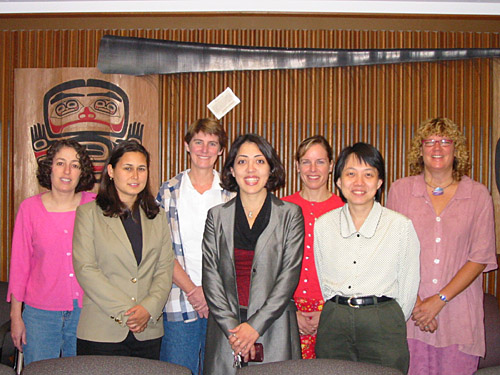


 |  |  | Preface |
In late June 2004 a workshop was held at Stanford University on the subject of mentoring for academic careers in Engineering. For two days (20-22 June) the workshop provided a forum on the needs, goals, methods, and best practices for mentoring engineering students interested in an academic career, for young faculty beginning such a career, and for recently tenured faculty. The emphasis was on mentoring members of underrepresented groups in academic engineering, especially women. The workshop was jointly supported by the Presidential Award for Excellence in Science, Mathematics, and Engineering (PAESMEM) through the National Science Foundation and by the School of Engineering at Stanford University. Workshop funding was largely devoted to providing local housing and sustenance for the workshop. Participation was by invitation and application. There were no registration or other fees.
 |
| 20% of the University of Washington |
| EE Faculty |
Participants included experienced mentors along with recent graduates and students who were considering, had begun, or had decided upon academic careers. Faculty in leadership positions were invited along with those emphasizing research and teaching. The workshop consisted of invited presentations, proposed presentations by participants that were accepted by the Organizing Committee, panel discussions, and informal discussions. There was an admitted bias towards EE/CS because of the constitution of the Organizing/Program Committee and the initial group of people involved, but it was not official and we welcomed all engineering disciplines (and other related disciplines where there was interest). The participants were primarily from electrical and computer engineering, but a variety of areas was represented from business schools to medicine.
The workshop consisted of three sessions on each of the two days. Each session focused on a specific topic and most began with brief (10 minutes) presentations by members of a panel followed by questions and discussion. Box lunches were provided for lunch on both days, and there were informal discussions and refreshments following the afternoon session. There was a reception following the final session on Monday.
The workshop had two primary goals. The obvious one was to provide an opportunity for mentors, mentees, and mentoring facilitators to educate each other and have fun doing so. Judging from feedback received during and following the workshop, this goal was successfully met. One woman professor observed that it was rare for her not to be the only woman professor at a meeting, and even rarer to be in the majority. Several male graduate students remarked on the educational value of for once being in a minority, of not having almost every one else look just like you. Without risk of overstatement, the workshop was unique in its composition, activity, and enthusiasm and it left a lasting impression on the more than seventy participants. It added connections to several personal networks and it has resulted in the formation of at least one new university organization for women in electrical engineering.
The second goal was a deliverable: to produce proceedings of the workshop, including summaries of the talks and discussions. Most of the
presentation slides are posted on the Web at
http://paesmem.stanford.edu/, but from the beginning it has been our plan to produce written proceedings of the workshop to make the presentations and discussions available to a wider audience.
Our hope was to produce
a document distilling the best practices, resources, family issues, and other important issues raised during the two days. This is that document. The workshop
organizing committee served as both session chairs and participants in the workshop and together
form the editorial committee. The proceedings are a combination of the material presented in the
slides and comments from the session chairs, presenters, and participants. There are also two
single author chapters written by workshop participants on the specific issues of the imposter
syndrome and on statistical studies of academic families.
| Eve Riskin, Mari Ostendorf, Pamela Cosman, |
| Michelle Effros, Jia Li, Sheila Hemami, |
| Robert M. Gray |

 |  |  | Preface |